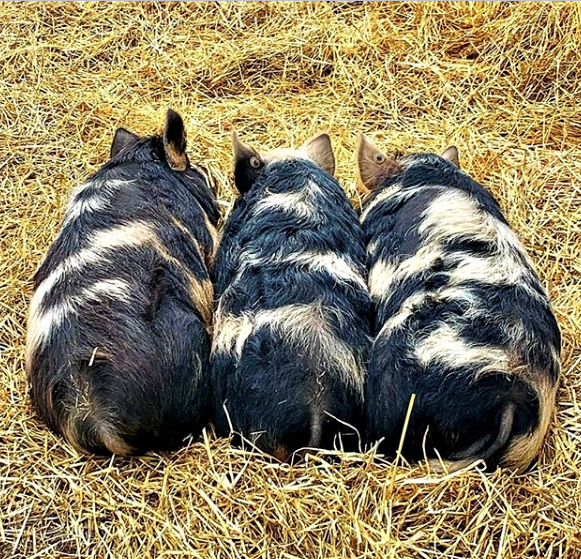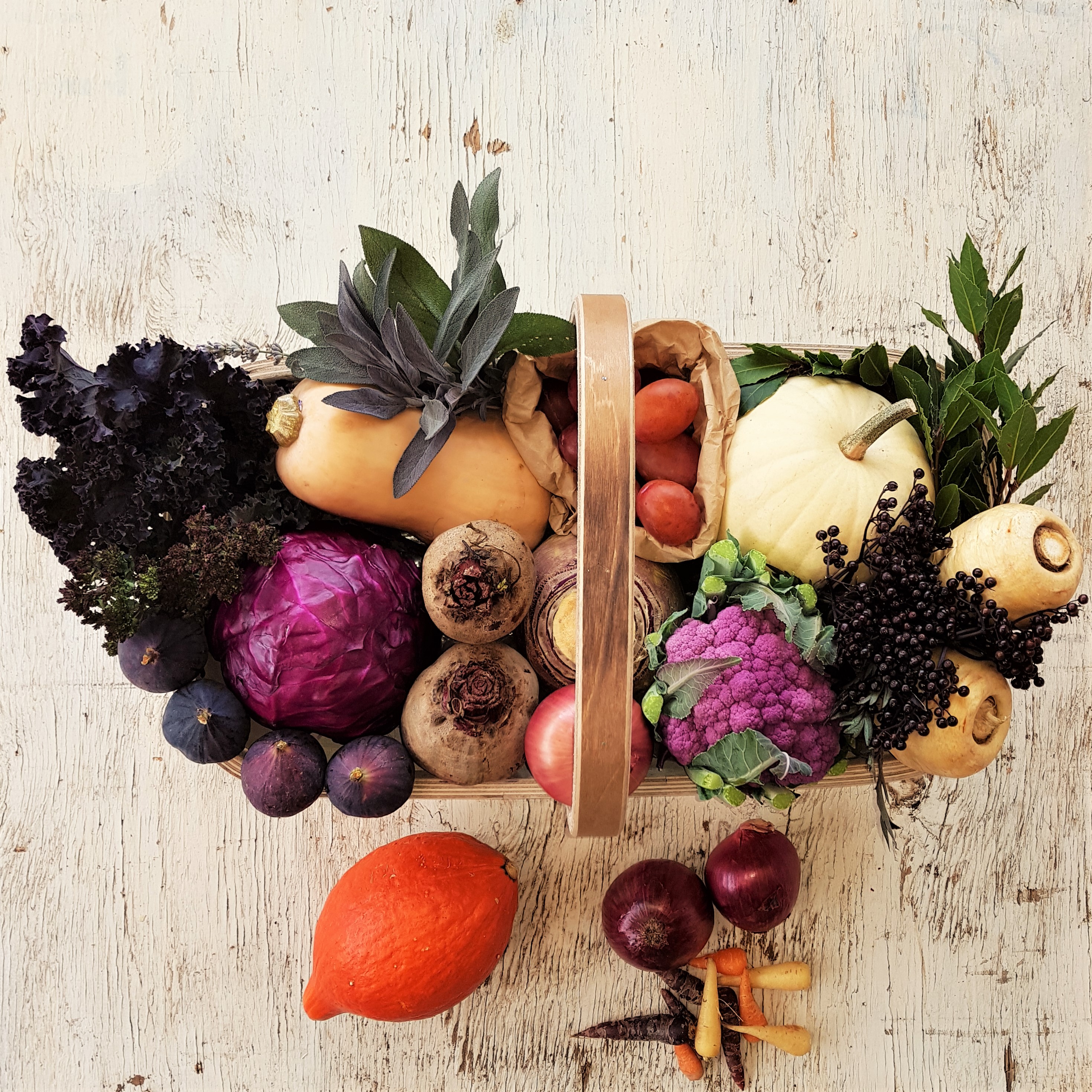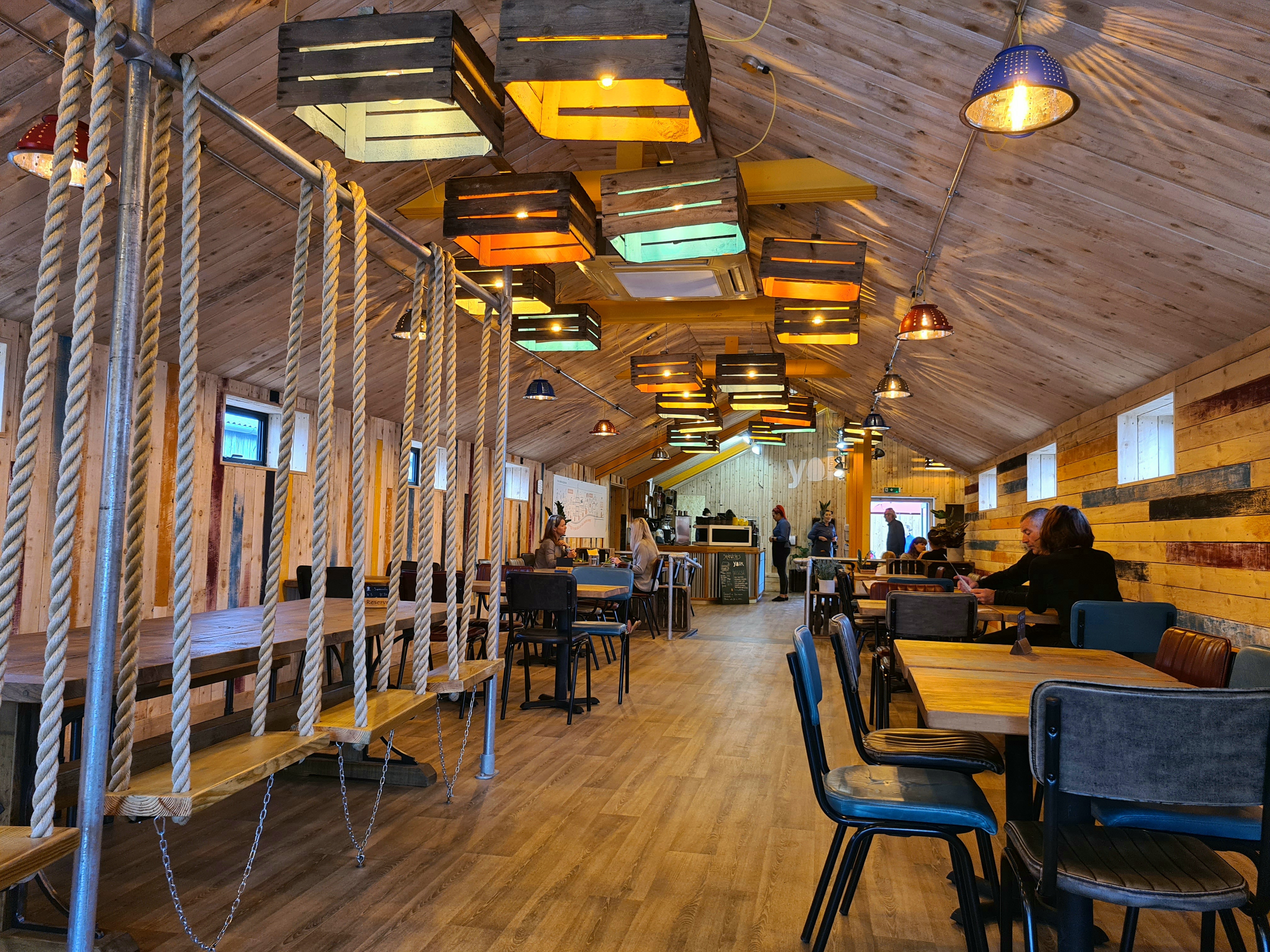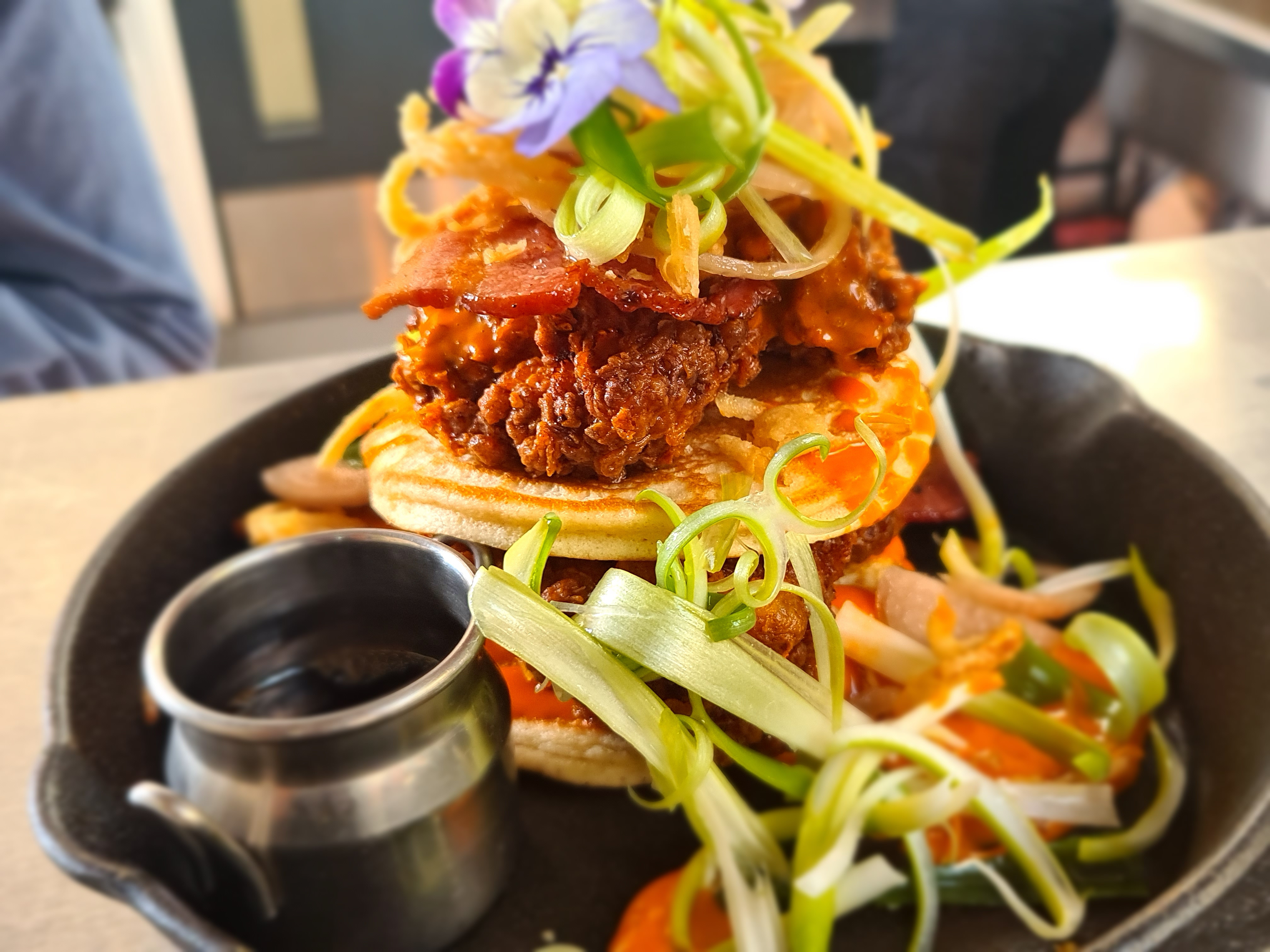Free digital copy
Get Speciality Food magazine delivered to your inbox FREE
Get your free copy
Running any kind of business can be considered an adventure. And Ben and Emma Mosey’s journey, from their university halls, via the Australian Outback and tropical jungles of Indonesia, circling back to North Yorkshire, has all the hallmarks of the best kind of adventure story. One filled with excitement, jeopardy and discovery.
Together, the couple run Yolk Farm in Minskip – home to their ‘world first’ on-farm free-range egg restaurant, where everything from the decor to the menu is inspired by the daily delivery of sunshine-yolked beauties from their flock of 500 hens.
What they’ve managed to create is, says Emma, truly far-removed from what they imagined life would look like when they met in their university days – her studying English, and Ben engrossed in geology. “My idea of what ‘countryside’ meant completely changed when I visited his home. I was like ‘oh, THIS is the countryside!’”
Emma was struck by the contrast in their upbringings. “I’d never been to a farm before I met him,” the now chair of the Farm Retail Association says. “You’re either born into a farming family, or you marry into it.”
Farming was left far behind when they moved to Australia for five years, following Ben’s career as a geologist searching for signs of copper and gold in the wild, unforgiving landscape of the Outback (unfortunately he didn’t strike it lucky).
The pair then moved to Indonesia, with Ben becoming almost a modern-day Indiana Jones, working his way through the humid junglescapes of Jakarta, and flying off at a moment’s notice while Emma settled down to write and finish her debut novel, How to Be a Good Wife (published as Emma Chapman). In 2015, though, they made the bold decision to pack up their exploring ways and return to the UK to help Ben’s dad out on the farm.
Something about farm life hit a nerve for Emma. In fact, it felt like something they both innately needed to do. They had all kinds of new-fandangoed ideas and aspirations. “But Ben’s dad wasn’t ready to retire, and there wasn’t room for Ben to do what he wanted,” Emma says. The hunt was on, then, for their own place, and they stumbled across Minskip Farm Shop which offered them room to expand, and grow something that would be their own.
Central to their plans, says Emma, was ensuring that whatever they did, it appealed to families, and inspired the next generation of farmers and shoppers. She recalls the total excitement she felt visiting Ben’s dad’s farm, feeding the lambs. “So many people don’t get access to this environment,” she says. I found that quite striking, and I wanted to make somewhere people could learn about farming in an interactive way. Something wholesome that would also support the local economy.”
The shop, as it stood, had a lot of potential, but it lacked the family audience Emma and Ben were so keen to reach – an audience that has become crucial to farm shops collectively in the UK.
Emma laughs when we ask about their retail experience. They had not a jot between them when they started the first stage of expansion in 2017, while looking after their inherited flock of thousands of hens. “It took us about a year to learn what on earth we were doing,” Emma laughs. “It was just us. I was going to the produce market twice a week and working in the shop while Ben worked on the farm.”

Animals were always destined to be part of the Yolk Farm story, and one of the very first things Emma wanted to do was introduce Kune Kune pigs, which remain incredibly popular with visitors. “People have been coming to feed the pigs for the last seven years. Some of them are now adults which is quite interesting. Having pigs is, I think, one of the first major things we did. Then we added a Christmas gift grotto that year too to gain a bit of extra retail space.”
Looks are everything, and throughout the project, at each stage, Emma says they have very carefully considered their branding and how any changes ‘fit’. “We worked with an agency and talked about our target market and who they would be in 35 years, and those meetings are where the name Yolk Farm was conceived. We knew the direction we were going in and who we were targeting, and that made other decisions a lot easier,” she explains. “We could say, ‘is the younger family we’re targeting going to like that?’. If it was a ‘yes’ we’d do it, if it was a ‘no’ we wouldn’t.”
Lots of reorganisation had to happen before the shop expansion fully opened, to ensure everything was just-so. “One of the simple but effective things we did was that we moved the fruit and vegetable section so it’s the first thing customers see when they come through the door, because that’s our crowning glory. It really gets customers in the mood to start filling their basket with fresh, delicious food.”
In the redesign fruit and vegetable lines were added, zero waste dispensers put in place, and a big row of fridges slotted in, enabling the shop to sell more deli items and meat. “We don’t have a butchery and deli counter,” says Emma, “so it was very important to have that space.”
Yolk Farm ramped up its own-branded products, introducing home baked sausage rolls and pork pies, and working with a trusted local producer to create the shop’s own range of jams and chutneys – more than 100 of them.
The selection of bakery items and alcohol were also increased. Other retailers might tell you anecdotally, the more you have, the more customers will spend, and this was certainly the case at Yolk Farm. After the expansion and with the addition of new lines, “customers that already came in put more stuff in their baskets,” says Emma.
As many other farm shops, business boomed during lockdown, which hit less than six months after expansion, delaying the opening of the on-farm restaurant.
“It was lucky that we had expanded,” Emma reflects, “because we were able to capitalise on that footfall.”

Restaurant staff were folded into the farm shop operation until food service was allowed to continue. The restaurant was inspired by the chickens Emma and Ben inherited, and represents the tide change they have made on site. “When we moved here there were 6,000 hens supplying supermarkets. We did that for the first two flocks over three years, but we soon realised the money we were making from supermarket contracts covered costs, but didn’t make any money. Using the eggs in a restaurant setting we have complete control over the cost, and can make money and add value!”
The flock was reduced to 1,500 birds, and then to 500. The birds were also moved out of their big barn due to the risk of avian flu, and switched to a mobile unit which automatically opens every morning, giving them plenty of space to roam free inside and out. “It’s very high welfare,” explains Emma. “They have loads of room and they are safe. We call it the ‘hen spa’. They love it down there.” The hens even have their own bodyguards in the form of a group of alpacas, who guard them from foxes. “They’re pack animals, and they’ll make a loud warning noise to scare them off,” Emma smiles.
Moving the flock had another benefit, in that it allowed the couple to transform the old chicken barn into an indoor/outdoor play area with farm-themed play stations (including a farm shop and grow-your-own veg), a sand pit, and a coffee bar for weary parents. “This all goes back to our vision of reconnecting people with food,” says Emma. “And that really needs to start with children.”
The chickens at Yolk Farm spend their days foraging in the grass, and gnawing on waste vegetables from the shop, which makes the yolks “really orange. It’s partly because they go outside and get their Vitamin D and eat grubs and scrap around. It’s better for you if they are eating more nutrients because the eggs are healthier.”
Eggs are literally the crowning glory on many of the dishes coming out of Yolk Farm’s kitchen, which caters for around 100 people at full capacity (inside and out). “It’s quite niche,” Emma admits, saying that’s part of the reason they went for it. “We talked a lot about whether we should open a tearoom and do a standard farm shop menu but, for us, it was really eggs that were at the centre of the farm. We thought we’d go hard on that as a concept. It’s also quite difficult to replicate unless you happen to have 500 free-range hens!”


Design throughout the eatery is playful and thoughtful. “Toilets have duck egg blue tiles with yolk drips running down,” explains Emma. “And on the toilet doors it says ‘laying’ instead of ‘engaged’. The whole place is clad with wood, and we’ve got apple crates upside down as lights, and swing seats. The designer does themed attractions like Warwick Castle, and they’ve got a lot of experience with theming, that’s why we chose them. It’s supposed to be a great environment for grown-ups as well as kids. It has to work for both. We have lots of kids come with their families, but also lots of couples who just enjoy our food.”

Service in the restaurant begins at 9am with an all-day brunch menu on offer. The bestseller is the kitchens’ chicken pancakes. “That’s fried chicken with buttermilk pancakes, hot hollandaise sauce, maple syrup and bacon. Then we’ve got dishes that are a bit more garden based. Fresh sweetcorn fritters with poached eggs…and a buddha bowl with all seasonal produce and an egg on top.”
Breakfast is incredibly popular, says Emma. “People come in just for our bacon sandwiches and breakfasts. Also, our cakes are amazing. They are all made in-house. We’ll have around three types of whole cake, from cheesecake to lemon meringue pie, and an amazing range of brownies, cupcakes and muffins in all different flavours.”
Appealing to all ages, younger diners can choose smaller versions of most things from the main menu, in addition to having their own menu, with options for toddlers and weaning children.
Adding the dining space has proved a huge success story for Emma and Ben, drawing in large crowds. It’s hard to think, Emma says, that when they started out there were only five car parking spaces, the shop was half the size, there was nowhere to eat, and the farm itself was closed to the public. “Now we’re so much bigger, we have the pigs, goats, alpacas, chickens, the farm is fully open with a farm walk, and there are dog walking fields you can rent.”
Emma very much sees farm shops as a huge part of the conversation around the future of food and shopping in the UK, and says they have, just in their own little corner of the world, seen growth in sales and interest, particularly in products they make themselves. “What customers want from farm shops,” she adds, “is good value local produce, and things made on site. That real, genuine connection to food. That’s why when we bake something it’s made by our chefs from our own produce, and that’s quite rare to find, but it’s something lots of farm shops do. That’s what makes them so special. And we need to shout about that more.”
Emma thinks more can be done to support farm retailers in their mission to supply local people with genuinely local fresh food. “There’s no voice for our industry apart from the FRA,” she says. “But we need someone else standing up to say we’re doing this properly, and supporting communities, we don’t break the bank, and shopping with us is more than putting something in a basket.”
Her advice for other farm shops looking to innovate, expand and broaden their appeal? “You have to like people,” she laughs. “If you are diversifying your farm to invite the public in, the family members within the farm have to want to do it too as often some of them will live on site.” On the flipside, she says, “It’s a hugely rewarding thing to do. Ben and I have learnt so much in the last seven years. I never would have predicted this.
“It’s been an amazing journey.” Not being afraid to try new things is her mantra. “We didn’t know anything when we started this, but we’ve learnt a lot along the way, and that’s one of the most freeing things. When you have the necessity, you will work things out because you have to. It’s a great feeling to know whatever happens we can deal with problems that arise and solve them together.”